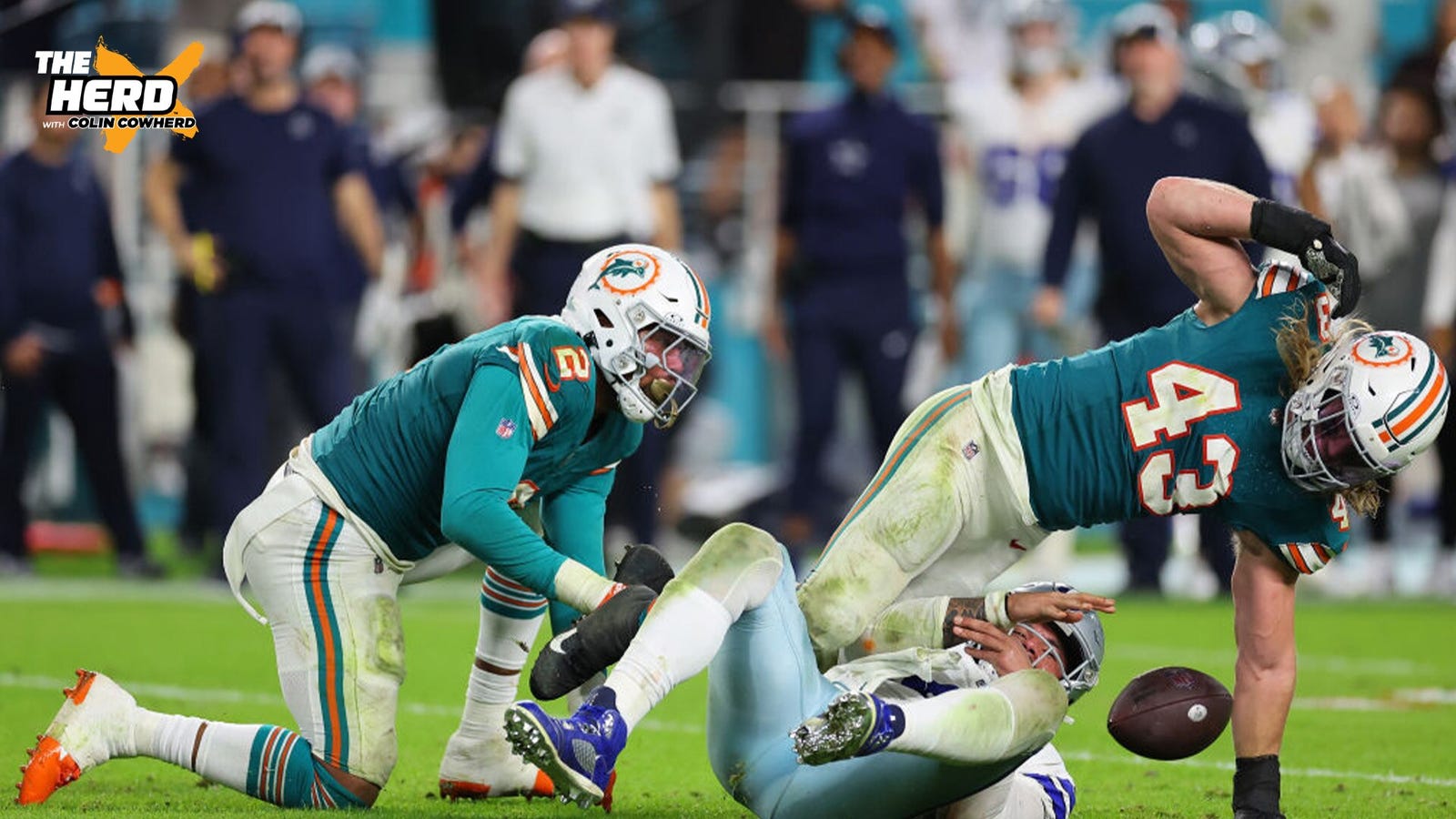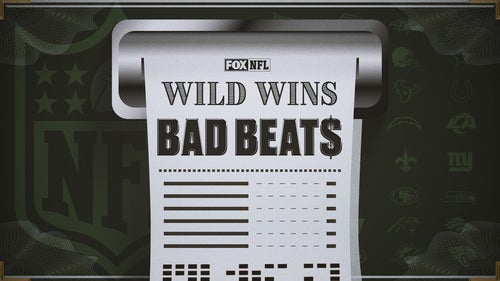
Inefficient run game has made Cowboys one-dimensional. Will it be their downfall?
The Dallas Cowboys made a statement on their first drive in Miami on Christmas Eve, after marching down the field with ease. They were at the Dolphins' 1 when they ran an option pitch to running back Tony Pollard, who ended up getting helicoptered inches short of the goal line.
On the next play, they dusted off rookie fullback Hunter Luepke and tried plowing him up the middle, only to see him and quarterback Dak Prescott somehow fumble the ball.
So, yes, the statement was made, even though it wasn't the one they thought they were making: The Dallas Cowboys are still a one-dimensional team because they just can't effectively run the ball.
That has been the story with them all season long, though the Cowboys (10-5) have mostly gotten away with it because Prescott has mostly played like an MVP. But in those key times when they need it, especially against good teams, and especially on the road, they have not mastered the art of complementary football. That was supposed to be an emphasis for Mike McCarthy this season, especially after he famously proclaimed in the offseason that "I want to run the damn ball."
But the Cowboys are running less — on only 42.2 percent of their plays, compared to 47.6 percent last season — in part because when they need it, the running game just isn't there.
It's not that they're terrible on the ground. They rank 12th in the NFL with 115.2 yards per game, which isn't far off where they were last season (135.2 yards, ninth in the league). It's more about how they get those yards. They were able to get them with some power last season when Ezekiel Elliott (876 yards) and Pollard (1,007) were a formidable 1-2 punch.
But then the Cowboys let Elliott go, assuming Pollard could lead the way by himself, which sure looks like a miscalculation. Pollard, still only 11 months removed from breaking his leg and needing surgery on his ankle, just hasn't gotten the job done. He's having roughly the same season he had last year, with 886 yards. But that's just 59 yards per game — four yards fewer per game than he had last season when he was the "No. 2" in that backfield duo. And he has just five rushing touchdowns one year after he had nine and Elliott had 12.
Maybe that shouldn't have been surprising. Pollard admitted just last week that his recovery was still affecting him in the first half of the season. He said he didn't feel like his old self until "a little bit after the bye week." That was in late October, and only then was he "starting to get into the groove of things."
"You think you're good, you think you're all the way back, until you're actually out there making plays, full speed, feeling it," Pollard said. "Once you get a feel for it and get your feet under you, then you start to realize, 'Oh, so I may have lost a little right there.' But I'm picking it back up."
Is he, though? In nine games since the bye week, he's averaging 57.3 yards per game on 4.2 yards per carry. He was averaging 61.7 yards per game and 3.9 yards per carry in six games before the bye. In fact, his two best games were in Weeks 2 and 3 — 72 yards on 25 carries in a victory over the New York Jets, and 122 yards on 23 carries in a loss in Arizona — when the Cowboys got some criticism for using him too much, too soon.
Even those paltry numbers, though, would be fine for Pollard if he still had Elliott picking up the rest. But with Elliott gone, and now in New England, there's no one else to pick up the slack. Rico Dowdle has shown some promise, but he has run just 80 times for 315 yards — and only two carries for four yards in Miami. Rookie Deuce Vaughn, the slippery, 5-foot-5, sixth-round pick, has been their third-most productive running back, but he's run just 21 times and been active in only six games.
So, it's no wonder nobody fears the Cowboys' ground game — something that still remains essential for most teams in the playoffs, even in this high-passing era. And it's no wonder the Cowboys, despite an offensive line that's still pretty good — Pro Football Focus ranked them third in the NFL before they played in Miami without injured left tackle Tyron Smith—have turned their ground attack into a series of options, end-arounds and outside runs.
Like on that first drive in Miami, which showed so much promise. It was a 15-play, 78-yard march to the 1, and they even ran the ball eight times. But Pollard only ran three times (for seven yards). They brought in Luepke — who had four carries all season to that point — for three short-yardage plays, including the goal-line fumble. They lined receiver CeeDee Lamb up in the backfield and ran him up the middle once. They ran an end-around to receiver Brandin Cooks from the 9.
It's creative and diverse, but it showed little trust in Pollard and a traditional running game. They had so little trust, in fact, that the drive nearly ended at the Miami 31 when they had third-and-2 and fourth-and-2 and ran pass plays out of the shotgun both times.
Then in the fourth quarter, trailing 19-13 with less than six minutes to go — a time when a powerful running game would seem to be most important — the Cowboys drove into the red zone again. Mike McCarthy even called two power runs for Pollard up the middle that picked up six and three yards and got the Cowboys to the Miami 4.
So, what happened next? Five straight pass plays — the drive was extended by a defensive pass-interference penalty — including one on first-and-goal from the 1 when Prescott ended up sacked. They ended up scoring the go-ahead touchdown on the only pass in that sequence that Prescott completed, thanks to an impressive catch by Cooks. But they again refused to trust Pollard and their rushing attack when they needed the tough, important yards.
And that's a huge problem on the road against good teams. They were blown out in Buffalo two weeks ago, 31-10, in large part because when the weather turned, the Bills started running (266 yards) and the Cowboys didn't (89). They've averaged just 79 rushing yards in their losses in Buffalo, San Francisco, Miami and Philadelphia.
And while some of that is because they've had to play catch-up in those games, their running game also has been far less effective. They've run for 3.7 yards per carry in those four games — a half-yard less per carry than in their other 11.
That's what they get for going from a 1-2 combo in the backfield to one punch that isn't very potent. And that's why things get so difficult against the better teams on the road, especially against teams with strong pass rushes like the Dolphins and Bills who rank second and third, respectively, in sacks in the NFL.
The 49ers and Eagles have good pass rushes too, of course, and the Cowboys are almost certain to have to go through one of them at least if they want to get to the Super Bowl. It will be a lot easier for those teams to disrupt Prescott and the passing game if they don't need to respect Pollard and the rushing attack.
So, if the Cowboys really want to make a run at their long-awaited championship, they'll need to do more of what McCarthy promised they'd do this season, and they'll need to do it better. They need to restore the faith and trust in Pollard and their ground game and get a little of that old respect back.
Ralph Vacchiano is the NFC East reporter for FOX Sports, covering the Washington Commanders, Philadelphia Eagles and New York Giants. He spent the previous six years covering the Giants and Jets for SNY TV in New York, and before that, 16 years covering the Giants and the NFL for the New York Daily News. Follow him Twitter at @RalphVacchiano.












